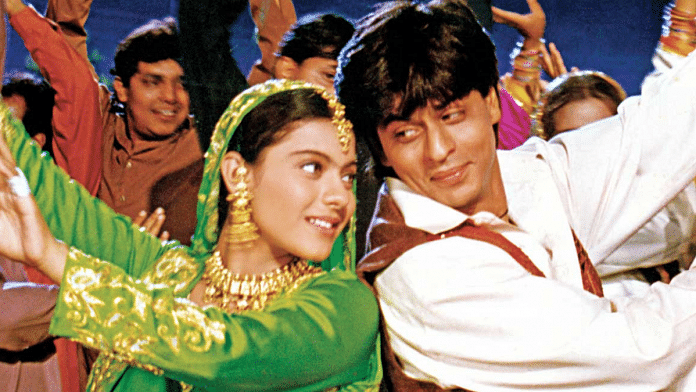There are some things best left untouched, especially iconic films like the 1995 Shah Rukh Khan-starrer Dilwale Dulhania Le Jayenge. But despite misgivings, a Broadway adaptation of the classic film has been created by its director Aditya Chopra himself. The musical, called Come Fall in Love – The DDLJ Musical opened today at the Old Globe Theatre in San Diego, California. The lyrics are by Nell Benjamin who also wrote the screen-to-stage adaptations of Legally Blonde (2001) and Mean Girls (2004), both quintessentially American films. Shoba Narayan plays Simran, and the music is by Bollywood duo Vishal and Shekhar.
While there is curiosity around the adaptation, there is also furore among Indian fans over the casting of Austin Colby as Raj Malhotra and the whitewashing of the iconic movie. DDLJ’s highlight was the celebration of desi culture, and to cast an American actor as Raj is just wrong, period. If the idea was to represent love across cultures, it would have been better to choose an actor of South Asian-American origin. Even if it has been adapted for an American audience, diluting the very essence of a desi love story is just playing slave to the mindset of “Oh, how will the white audience relate?”
‘Gora’ Raj
DDLJ was Chopra’s directorial debut, and the cult following around it is remarkable. What made it an iconic movie was the fact that Raj ‘desifies’ himself and wins over Simran’s authoritative father — from being a non-resident Indian, he reinvents himself for the sake of his love. The quintessential entitled brat undergoes a change of heart and becomes mature as he tries to win the approval of Simran’s (Kajol) father (Amrish Puri). Whether or not it has aged well is a different matter altogether. But the idea of home, love, and family stuck with the ’90s audience in India.
The casting of Austin Colby casts doubt, especially since the Broadway adaptation is being produced by Aditya Chopra himself. We are now living in a world where more Indians watch K-dramas than perhaps even Koreans themselves, while foreigners want big fat Indian weddings. As such, getting an American to play Raj makes exactly zero sense.
While it has been asserted that 50 per cent of cast members in the production are South Asians, it still doesn’t do any justice. Aladdin (1992) was adapted on Broadway with two South Asian leads, one of them was Shoba Narayan.
Also read: How Shah Rukh Khan ‘romantically ruined’ women – married, working, mothers
Why do we need ‘sympathetic’ reading at all?
In an Instagram post from August, Aditya Chopra tried to justify the reasons for choosing an American actor to play Raj in the Broadway adaptation. “The most powerful way to depict a country’s culture and values is to see it from the perspective of someone who does not belong to the same culture,” he wrote.
What is inherently flawed in this idea is that colonial appropriation — American or British — has always remained a part of popular culture across the world, especially in Indian art. Why do we need a ‘sympathetic’ reading? It is absolutely redundant to ‘shift perspective’, so to say.
In an analysis of representative politics, a study by The Guardian found that in 2020, only 6.9 per cent of the roles went to Asian-American actors (down from 7.3 per cent in the prior year). These dismal numbers make the casting of Colby look even worse.
Throughout the decades, Indians in the US have experienced rampant racism, and the subsequent generations have tried to ‘fit’ into the dominant narrative. Casting an American actor also effectively takes away a South Asian actor’s chance to play Raj. It compromises the authenticity of a film that had managed to strike a chord with NRIs who were struggling to embrace their culture in an often-hostile space abroad.
Views are personal.
(Edited by Humra Laeeq)



